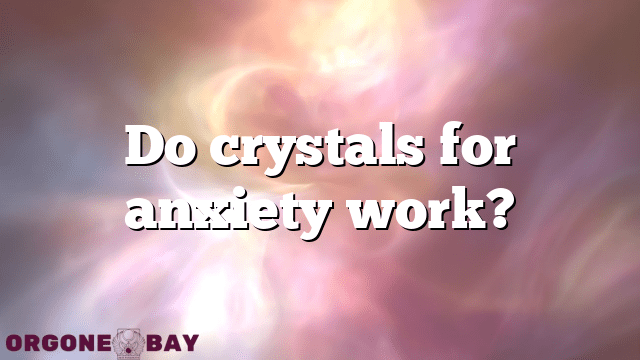Crystal Myths Controversies & Misconceptions
Do crystals for anxiety work?
Using crystals as a method for healing psychological issues, such as anxiety, is a practice that has been relied upon for thousands of years. However, recent studies are calling into question the effectiveness of this healing method in regards to treating depression and anxiety. While some individuals continue to swear by the power of crystals, it is important to consider the validity of these claims and explore alternative approaches to maintaining mental well-being.
• While crystals may not be a quick fix for anxiety, they have been shown to have properties that promote calmness and relaxation
• Amethyst is often used as a form of meditation aid and is said to have calming properties
• Rose quartz is believed to promote feelings of love and compassion, which can aid in reducing anxiety
• Mindfulness practices, exercise, and therapy have been shown to be effective in treating anxiety and depression and may be valuable additions to any mental health routine
• It is important to prioritize seeking professional help in addition to any alternative healing methods for the best possible mental health outcome.
Ultimately, while crystals may be a tool to incorporate into your mental health routine, it is important to prioritize evidence-based practices and seek professional support for managing any mental health issues.
Table Of Contents
The History of Crystal Healing and Anxiety
The use of crystals for healing dates back thousands of years, with evidence suggesting that ancient civilizations such as the Egyptians, Greeks, and Romans used them for various purposes. While it is unclear when exactly crystals were first used to treat anxiety, many believe that their calming and grounding properties make them an ideal choice for those who struggle with stress and worry.
In recent years, the use of crystals for anxiety treatment has become increasingly popular, with many people turning to these stones as a natural and holistic alternative to medication. However, the efficacy of crystal healing for anxiety is still up for debate, and scientific studies on the topic have provided mixed results.
How Crystals are Used for Anxiety Treatment
Proponents of crystal healing often believe that certain types of crystals have specific healing properties that can help alleviate symptoms of anxiety. For example, rose quartz is thought to promote feelings of self-love and acceptance, while amethyst is believed to aid relaxation and help with sleep.
There are several different ways that crystals can be used for anxiety treatment, including holding them during meditation or carrying them in a pocket throughout the day. Some people also place crystals in their home or workplace to create a calming environment.
While the use of crystals for anxiety treatment is generally considered safe, it is important to note that they should not be used as a substitute for professional medical advice and treatment.
Scientific Studies on Crystal Healing for Anxiety
Despite the long history of crystal healing, there is a lack of scientific evidence to support its efficacy for treating anxiety. A study published in the Journal of Anxiety and Depression in 2018 found that while some participants reported feeling more relaxed after holding a crystal during a stressful task, there was no significant reduction in anxiety symptoms overall.
Another study published in the Journal of Complementary and Alternative Medicine in 2019 also found no significant difference in anxiety levels between those who received a crystal healing session and those who received a placebo treatment.
While these studies provide limited evidence on the effectiveness of crystal healing for anxiety, they suggest that more research is needed before it can be considered a legitimate treatment option.
Why Crystals Do Not Work for Anxiety Treatment
There are several reasons why crystals may not be effective for treating anxiety. One explanation is that the reported benefits of crystal healing may be due to a placebo effect, where people experience an improvement in symptoms simply because they believe the treatment will work.
Additionally, anxiety is a complex condition that often requires multifaceted treatment approaches, including medication, therapy, and lifestyle changes. While crystals may provide temporary relief, they are unlikely to address the underlying causes of anxiety and may not have a significant impact on overall symptom reduction.
Alternative Methods for Managing Anxiety
While crystals may not be a reliable treatment option for anxiety, there are several alternative methods that have been shown to be effective in managing symptoms. These include:
– Cognitive-behavioral therapy (CBT), which helps individuals identify and change negative thought patterns
– Mindfulness-based stress reduction, which teaches individuals to focus on the present moment and reduce worry
– Regular exercise, which can help reduce stress and increase feel-good neurotransmitters in the brain
– Meditation or deep breathing exercises, which can promote relaxation and have been linked to reduced anxiety symptoms
It is important to work with a healthcare professional to determine the best treatment plan for managing anxiety.
Misconceptions about Crystal Healing for Anxiety
Despite the lack of scientific evidence supporting the use of crystals for anxiety treatment, many people still believe in their healing properties. However, it is important to be aware of common misconceptions about crystal healing, including:
– Crystals are not a substitute for medical treatment
– Not all crystals are created equal and may not have the same healing properties
– There is no scientific evidence to support the efficacy of crystal healing for anxiety
It is also important to practice safe crystal use, including properly cleaning and energizing the stones and avoiding any potential allergic reactions.
In conclusion, while the use of crystals for anxiety treatment may have a long history, scientific studies have yet to provide significant evidence to support their efficacy. Alternative methods such as therapy, exercise, and mindfulness practices may be more effective in managing anxiety symptoms. As always, it is important to talk to a healthcare professional before attempting any new or alternative therapies.

